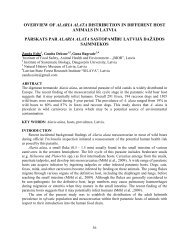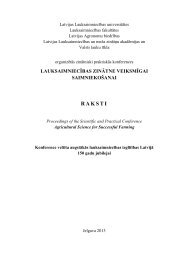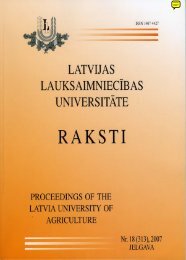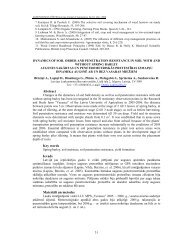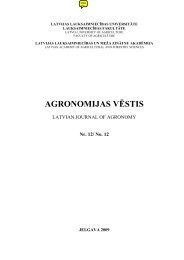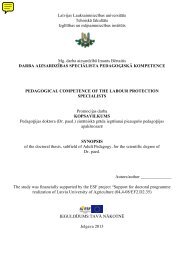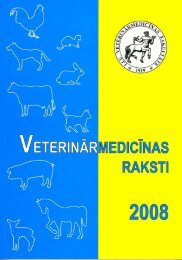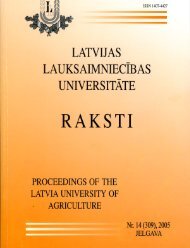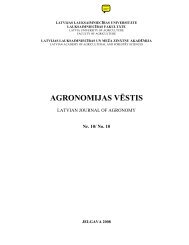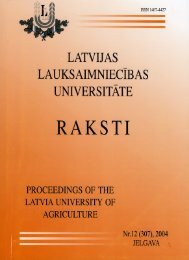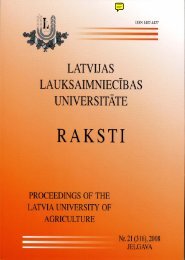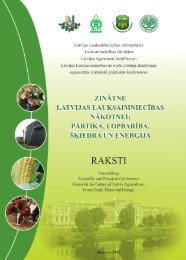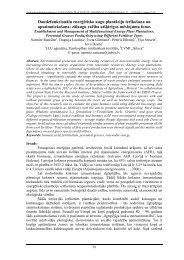Latvia University of Agriculture - Latvijas Lauksaimniecības ...
Latvia University of Agriculture - Latvijas Lauksaimniecības ...
Latvia University of Agriculture - Latvijas Lauksaimniecības ...
Create successful ePaper yourself
Turn your PDF publications into a flip-book with our unique Google optimized e-Paper software.
E. Stalidzāns et al. Information Technologies Step into New Scientific Areas<strong>Agriculture</strong>, and St.Petersburg State Agrarian <strong>University</strong>, established the BioinformaticsNetwork, within the framework <strong>of</strong> which the project “Nordic–Baltic–Russian academicnetwork in bioinformatics” was developed for the financing <strong>of</strong> the Nordplus Neighbourprogramme (project leader – I. Arhipova, executors – L. Paura, and E. Stalidzāns)(Arhipova, Bāliņa, 2004; Arhipova, 2006a, 2006b; Paura, Arhipova, 2007). Within theframework <strong>of</strong> the project, international courses were organized for the master students <strong>of</strong>the Baltic States. Foreign guest lecturers were invited from the <strong>University</strong> <strong>of</strong> Copenhagen,Norwegian <strong>University</strong> <strong>of</strong> Life Sciences, <strong>University</strong> <strong>of</strong> Tartu and other higher educationestablishments. The themes <strong>of</strong> the courses covered a wide range <strong>of</strong> topics and werearranged into three larger themes:– biology (the courses took place at the Lithuanian <strong>University</strong> <strong>of</strong> <strong>Agriculture</strong> in2006);– analysis <strong>of</strong> biological data (the courses took place at the <strong>University</strong> <strong>of</strong> Tartu in2007);– bioinformatics (the courses took place at LLU in 2007).Together with the implementation <strong>of</strong> the international project, within the framework<strong>of</strong> the EU Structural Fund project “The modernization <strong>of</strong> the information technologystudy programmes at the <strong>Latvia</strong> <strong>University</strong> <strong>of</strong> <strong>Agriculture</strong>” (project leader – I. Arhipova,2005-2007) ITF improved its master study programme. One <strong>of</strong> its main objectives wasimprovement <strong>of</strong> the curriculum for the study programme trend “Bioinformatics”.Systems Biology and Synthetic BiologyIn 2005, after the involvement into the international bioinformatics project “Nordic–Baltic–Russian academic network in bioinformatics” (lead by pr<strong>of</strong>. I. Arhipova andimplemented within the framework <strong>of</strong> the programme Nordplus Neighbour), E. Stalidzānsbecame interested into the systems biology; the theme <strong>of</strong> his dissertation is close to thenew scientific discipline. The mission <strong>of</strong> the systems biology is: by means <strong>of</strong> mathematicalmodelling integrate the huge amount <strong>of</strong> the accumulated molecular biology informationinto a single, dynamic holistic perspective in order to show how the systems’ qualities <strong>of</strong>an animate emerge out <strong>of</strong> the molecular interaction and, at the same time, to provide anopportunity to anticipate precisely and quantitatively the reaction <strong>of</strong> the cells towards theperformed genetic modifications or changes in the external environment.There are excellent preconditions for the development <strong>of</strong> systems biology at theITF, because the field is interdisciplinary and the computer technology is one <strong>of</strong> themost powerful instruments in the systems biology (Žukova, Stalidzāns, 2006).Besides, this trend agrees with the activities <strong>of</strong> the master study specialization “IT inBiosystems”. This has facilitated intensive participation at international conferences(6 conferences in 2006) in order to understand the present developmental stage andfuture trends <strong>of</strong> the systems biology and to choose “the main emphasis” <strong>of</strong> futurescientific activities when getting involved in international projects. The application <strong>of</strong>control theory methods for the management <strong>of</strong> biological systems by means <strong>of</strong> technicaland biological aids was chosen as the main research trend (Mozga et al., 2006). Themain instrument in this trend is the computer, which is used for the solution <strong>of</strong> modellingand optimization problems. At present the research on the trend <strong>of</strong> systems biology isperformed by four doctoral students (according to their enrolment): I. Mozga (Artificialintelligence for the dynamics modelling <strong>of</strong> glicolysis processes (Lagzdina et al., 2008)),U. Grunde-Zeiferts (Computer control algorithms for the molecular processes <strong>of</strong> cells),V. Brusbārdis (The control network model <strong>of</strong> the thermostress reaction <strong>of</strong> a humancancer cell), and T. Rubina (Computer modelling <strong>of</strong> the structure <strong>of</strong> biochemical controlnetworks).One <strong>of</strong> the themes addressed is the analysis and contrasting <strong>of</strong> technical and biologicalsystems and their control principles on the scale <strong>of</strong> many generations (Mozga et al.,2007).Since 2007, ITF has been co-ordinating the international innovation transfer project“Modular education for interdisciplinary systems biology” (MOSBIO) (Stalidzans, Mozga,2008). The project is implemented within the framework <strong>of</strong> the “Leonardo da Vinci”programme, and the partners involved in the implementation <strong>of</strong> the project are fromGermany, Finland, Spain, and Estonia.The projects related to the systems biology and financed by the <strong>Latvia</strong>n Council<strong>of</strong> Science are being implemented: “Rationalization <strong>of</strong> bi<strong>of</strong>uel production by means <strong>of</strong>the dynamic models <strong>of</strong> biochemical reaction networks” (project leader – E. Stalidzāns,94 <strong>Latvia</strong> <strong>University</strong> <strong>of</strong> <strong>Agriculture</strong> – 70, 2009



